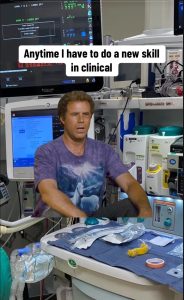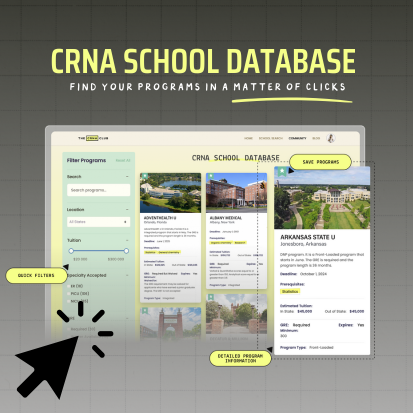The clinical phase of CRNA school hits differently. It’s the part you’ve been waiting (and studying) for, but nothing fully prepares you for the steep learning curve ahead. Here’s what I wish someone had told me before I stepped into the OR as an SRNA.

- You’ll Feel Like You Know Nothing at First – And That’s Normal
No matter how well you did in didactic, your first clinical day as an SRNA will likely feel like a crash course in humility. Textbooks and high-fidelity simulations are helpful, but they can’t replicate the fast pace and unpredictability of the OR. Expect sweaty palms, information overload, and a healthy dose of impostor syndrome. It’s part of the process. Trust me, every SRNA has been there.
- Preceptors Are All Difference – Adaptability Is Key
One of the most underrated CRNA clinical tips: read the room. Some preceptors love to teach and offer step-by-step guidance. Others expect you to keep up and learn by observing. The key to thriving during your clinical phase of CRNA school is adaptability. Ask smart questions, take constructive criticism seriously, and don’t take feedback personally. Growth in nurse anesthesia clinicals comes from being teachable.
- Time Management Will Make or Break You
Your efficiency matters, big time. Get to your clinical site early, review your patient and case the night before, and set up quickly and cleanly. Organization helps reduce stress and shows your team you’re serious. And yes, “lunch” might be a granola bar scarfed down between cases. Welcome to life in the OR.

- You’re Not Just Learning Anesthesia – You’re Learning People
CRNA clinical training isn’t just about mastering intubation techniques or anesthetic plans. You’ll also need to work closely with surgeons, scrub nurses, CRNAs, and anesthesia techs. Your professionalism, attitude, and ability to communicate will set the tone. Be kind, helpful, and never act like any task is beneath you. That reputation follows you.
- It’s Okay to Make Mistakes – Own Them and Learn.
Every SRNA will make mistakes. It’s how you handle them that defines your clinical experience. Stay calm, be honest, and reflect on what happened. Owning your errors builds credibility with your preceptors and shows maturity. Nurse anesthesia clinicals are designed to challenge you—and that includes learning from failure.
- Self-Care Isn’t Optional
Anesthesia school burnout is real. You cannot perform at your best if you’re sleep-deprived, dehydrated, or mentally drained. Prioritize the basics: rest, hydration, movement, and mental resets, even if it’s just a 10-minute walk post-call. SRNA wellness isn’t a luxury; it’s a survival tool.

- The Growth Is Wild
You’ll go from shaky hands placing your first IV to confidently running a room. Clinicals are where your knowledge clicks into place. Trust the process. Every tough shift, awkward preceptor interaction, or missed line is part of the journey to becoming a confident, competent CRNA.
Final Words of Encouragment
The clinical phase is challenging, humbling, and incredibly rewarding. You’re not just becoming a CRNA, you’re becoming your version of one. Be patient with yourself, show up ready, and remember, you belong here.
Ready for more tips on how to get into CRNA school? Check out our community here!



